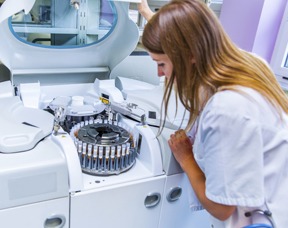NEW YORK, NEW YORK (PRWEB) JUNE 01, 2017
At the annual 2017 American Urological Association’s meeting in Boston, one of the studies presented was a study on a new test called IsoPSA– a novel assay of measuring serum PSA.
“This new approach of measuring PSA through IsoPSA test is for helping to discriminate benign from malignant causes of rise in PSA and it would also help in discriminating between high-grade from low-grade prostate cancer,” said Dr. David Samad i. “One problem with the current PSA test is that it cannot differentiate benign causes from prostate cancer. I believe this approach could be a huge move forward for getting a much better picture of what is going on when making a decision for a patient with an elevated PSA level.”
This recent prospective study looked at 261 men with prostate cancer and found that the specificity of the IsoPSA assay in distinguishing high-grade prostate cancer (Gleason score of 7 or higher) from benign disease (Gleason score of 6 or less) was 0.81. In comparison, total PSA assays had a specificity of 0.69.
At the same time, the researchers also compared IsoPSA with the Prostate Cancer Prevention Trial (PCPT) risk calculator 2.0. This calculator incorporates total PSA, free PSA, age, race, and digital rectal examination and prior biopsy findings. The PCPT calculator had predictive value of 0.67 for discriminating high-grade from benign disease.
Proteins produced by cancer cells vary by having different 3D structures or isoforms than what normal cells produce of the same proteins. This new test of IsoPSA can measure all of the different molecular isoforms in serum PSA. “What makes IsoPSA special is the fact in just a single blood test, it can provide urologists the necessary information we need when making clinical decisions regarding prostate cancer,” explained Dr. Samadi. “Plus, because of the accuracy of this test, it is possible that many unnecessary prostate biopsies can be prevented.”
“At this time, the standard available assays we have do not measure abnormal truncated or glycosylated forms of PSA,” stated Dr. Samadi. “The IsoPSA can measure PSA differently from our current method by measuring all PSA isoforms in serum much more accurately to discriminate high-grade cancer from benign disease.”
Dr. Samadi went on to add, “Another important advantage of this new assay is that it does not require any special equipment. Cancer changes with time and that means isoforms existing at one time can change at another time. This means that IsoPSA that can also provide us with useful information in the follow up of the patients undergoing active surveillance. I look forward to seeing how this new way of testing can improve our current standard of diagnosing prostate cancer.”
Patients newly diagnosed with prostate cancer can contact world renowned prostate cancer surgeon and urologic oncologist Dr. David Samadi at 212-365-5000 for a free phone consultation. To learn more visit ProstateCancer911.com.


